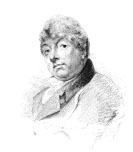Thomas Johnes (the younger)
| Thomas Johnes | |
|---|---|

Thomas Johnes, Esq,
by W. Worthington after Stothard |
|
| Born | 1 September 1748 Ludlow, Shropshire, England |
| Died | 23 April 1816 Langstone Cliff cottage, Devon |
| Resting place | Eglwys Newydd (Saint Michael's Hafod Chapel) 52°22′12″N 3°57′42″W / 52.369939°N 3.961772°W |
| Residence | Hafod Estate |
| Nationality | Welsh |
| Education | Shrewsbury Grammar School, Eton, Jesus College, Oxford and University of Edinburgh |
| Alma mater | Jesus College, Oxford |
| Occupation | M.p., landlord, printer, writer, landscape architect, farmer |
| Known for | Agricultural endeavours at Hafod Estate |
| Title | Esquire, Colonel, Lord Lieutenant, Knight of the Shire |
| Spouse(s) | Maria Burgh of Monmouthshire; Jane Johnes of Dolaucothy |
| Children | Mariamne Johnes, (b. 30 June 1784, d. 4 July 1811), Evan Johnes, (b. 1786, died in infancy) |
| Parent(s) | Thomas Johnes of Llanvairchydogus and Elizabeth Knight, Croft Castle |
| Relatives | Richard Knight of Downton, Marchweithian, Lord of Isaled, William Wilberforce |
Thomas Johnes (1 September 1748 – 23 April 1816) was a Member of Parliament, landscape architect, farmer, printer, writer and social benefactor. He is best known for his development of the Hafod Estate in Wales. Johnes was born in Ludlow, Shropshire, England. Upon moving from his family home at Croft Castle to an isolated area near Cwmystwyth, in Ceredigion, Wales, Johnes began his life works by building a church for the local tenants, a school, and magnificent gardens, walks and bridges. He undertook experiments in sheep and cattle breeding together with the growing of new crops and a thriving dairy was established. Trees were planted in great quantities on land considered unsuitable for crops; Johnes obtained the Royal Society of Arts medal five times for planting trees. He encouraged his tenants to improve their farming practices when in 1800 he published A Cardiganshire Landlord's Advice to his Tenants, with a Welsh translation and offered prizes for good crops. He was also one of the chief supporters of the Cardiganshire Agricultural Society, founded in 1784. Johnes devoted his entire life fortune to improving Hafod Estate.
Johnes belonged to an old Welsh Carmarthenshire and Cardiganshire family. He was related to William Wilberforce through his mother's aunt Anne Knight. This side of his family can trace to Marchweithian, Lord of Isaled and Aed Mawr, a prince among the first colony of the Britons.
He was the oldest son of Thomas Johnes (c. 1721–1780) of Llanfair Clydogau and his mother was Elizabeth, daughter of Richard Knight of Croft Castle, Herefordshire. Born on 1 September 1748, he was baptised at Saint Laurence's Church in Ludlow. After first being taught to read English at a local preparatory seminary in his native town, Johnes attended, at the age of seven, Shrewsbury School where he remained for four years. In 1760, he was enrolled in Eton where he remained for seven years; during this time he studied the Latin classics and the Greek language under the direction of William Windham. In 1767, he attended a course of lectures on Logic and Moral Philosophy at the University of Edinburgh. Mr. Johnes left Edinburgh in the latter end of the year 1768, and immediately commenced an extensive tour on the continent accompanied by Robert Listen, Esq. Under his guidance, Mr. Johnes proceeded through France, Spain, and Italy. He next proceeded to Switzerland, and following the course of the Rhine as far as Strasburgh, ventured through Alsace and Loraine to Paris, where they took residence for several months. Returning from the trip in the year 1771, Johnes remained nearly three years in Herefordshire society, and in the rural pursuits suited to his age. In the year 1774, however, tired of a life of pleasure, he was determined to devote himself to more worthy and more important cause; he ran as candidate for the borough of Cardigan and was opposed by Sir Robert Smith. Johnes eventually won by petition.
...
Wikipedia
